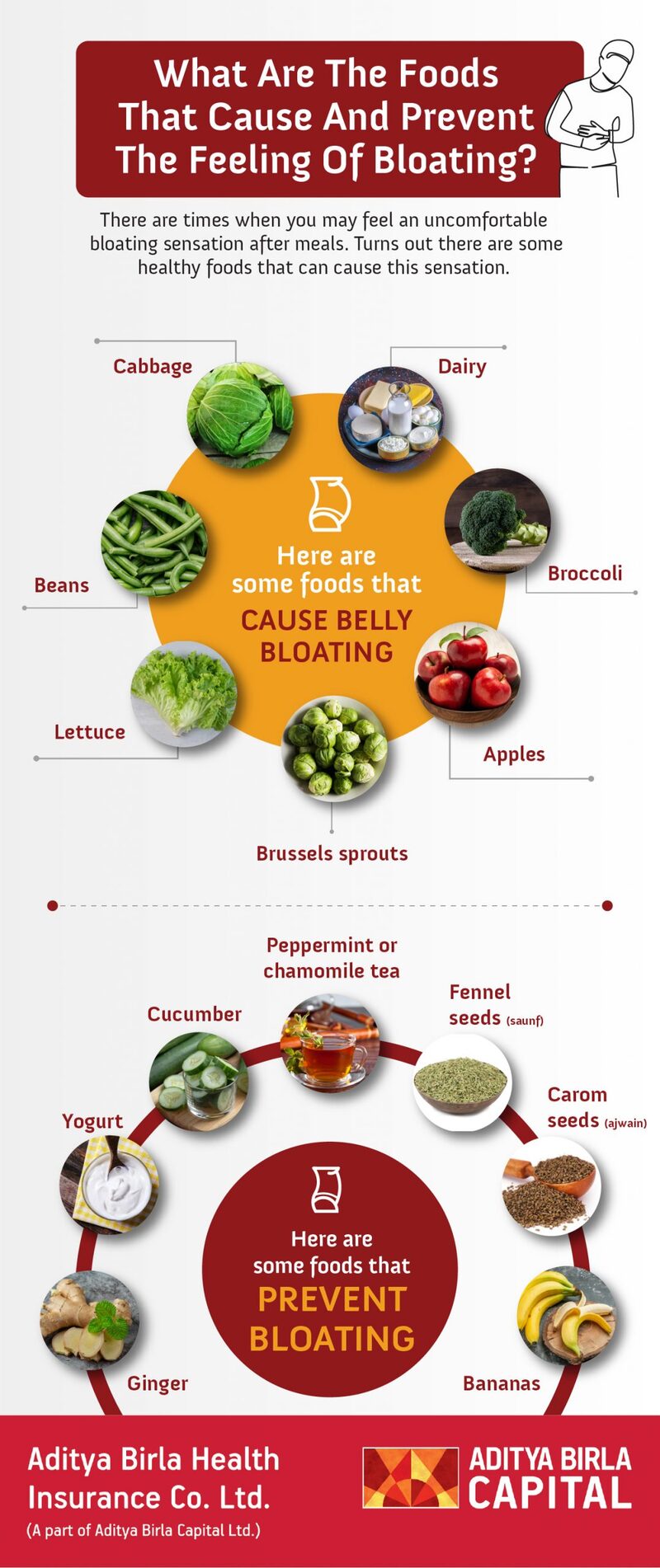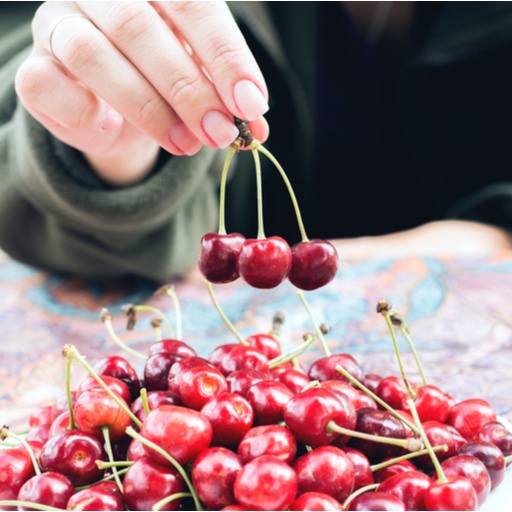
A bloated stomach is a digestive issue that causes uncomfortable tightness and fullness. The most common cause of stomachache and bloating is excess intestinal gas. The reason might be as simple as eating too fast or having an intolerance toward some food, which results in gas and digestive content building up. This leaves less space in the abdomen, including circulatory fats and fluids, which makes your stomach feel tighter.
Read this blog to know all about bloating, what causes bloating, and the foods that can prevent bloating.
What causes stomach bloating?
You must have experienced your stomach getting suddenly enlarged after eating. It is usually accompanied by gas, which can cause a feeling of heavy pressure in the abdomen. This biological phenomenon is bloating, which causes discomfort in your waist area.
Bloating often occurs when your body holds on to extra water or gas builds up in the intestines. Gas building in the digestive tract can also cause constipation. There are many reasons behind experiencing bloating. Here are the most common causes of bloating:
1. Eating quickly:
Gobbling food can result in swallowing air with your food, leading to bloating. This is because the air gets trapped in your stomach, causing it to expand.
2. Consuming excess food:
Overeating in a sitting also causes bloating. Eating more than your stomach can handle puts strain on your digestive tract, which can cause bloating.
3. Eating many gas-inducing foods:
Many foods are more prone to create gas in the digestive tract, such as beans, lentils, cabbage, broccoli, and onions. Eating these a lot can cause bloating.
4. Constipation:
When you’re constipated, it means that your bowel movements are infrequent or difficult. This can cause a buildup of gas in your intestines, leading to bloating.
5. Hormonal changes:
Women may experience bloating during their menstrual cycle due to hormonal changes.
6. Medical conditions:
In some cases, bloating occurs due to several diseases like irritable bowel syndrome (IBS) or celiac disease.
Now that you know what causes bloating, let us look at the foods that cause bloating.
Foods that cause bloating
Although nutritional foods are good for your health, some foods cause this bloating sensation. Let’s discuss the foods that cause bloating and what you can do to prevent it.
1. Beans:
Beans are highly nutritious foods rich in fiber and protein. However, they contain oligosaccharides, a form of sugar that is difficult to digest, resulting in bloating. They also contain complex carbohydrates that are difficult to digest.
Try soaking beans overnight before cooking them. Be sure to chew them well when eating.
2. Cruciferous Vegetables:
Some veggies like broccoli, Brussels sprouts, and cabbage contain raffinose, a sugar that remains undigested unless the good bacteria in your gut ferment it. Continue eating green vegetables, but you can limit the portions.
If you want to reduce the risk of bloating, cook these vegetables before you eat. It will make them easier to digest.
3. Onions and Garlic:
Onions and garlic are staple ingredients in many dishes, but they can also cause bloating. They are full of fructans, a fiber that can cause bloating or abdominal pain in some individuals as it is not well-absorbed by the small intestine.
Use smaller amounts of onions and garlic when cooking, or substitute them with other herbs and spices. Onion powder can also be an excellent option for getting rid of the ill effects of onion.
4. Milk-based Products:
If consuming dairy products makes you feel gassy, you might be lactose intolerant. This indicates that your body lacks the necessary enzymes to break down the sugar found in dairy – lactose. Dairy products like milk, cheese, and ice cream are high in lactose. Needless to say, excess of it can cause bloating.
To prevent bloating from dairy products, use lactose-free alternatives or take lactase supplements before eating.
5. Artificial Sweeteners:
Artificial sweeteners like sorbitol and xylitol are commonly found in sugar-free gum, candy, and diet drinks. These sweeteners can cause bloating and digestive discomfort when consumed excessively.
To prevent the ill effects of Artificial Sweeteners, avoid foods that contain artificial sweeteners and substitute them with natural sweeteners like honey or stevia instead.
Foods that prevent bloating
Now that you know what foods cause bloating, let’s review some foods that prevent bloating and relieve your gut health.
1. Cucumber:
Consuming cucumber can provide significant relief as it contains quercetin, a flavonoid antioxidant that reduces swelling. In addition, the high-water content can reduce inflammation.
2. Ginger:
Just like cucumber, ginger is great for treating bloating and inflammation. It reduces inflammation in the gut and prevents bloating. Add fresh ginger to smoothies or teas, or use it in cooking.
3. Bananas, Oranges, and Pistachios:
They are rich in potassium and regulate sodium levels in the body to prevent water retention. Constipation can also cause bloating. A banana contains soluble fiber, preventing constipation. Eating a lot of bananas can also balance a high-salt diet. However, avoid eating ripe bananas as they are notorious for causing gas problems.
4. Yogurt and Probiotic Food:
Probiotic foods are beneficial for your gut health as they promote the growth of good bacteria to regulate digestion and the overall health of your digestive tract. Yogurts and other probiotic foods are also great for digestion. Consuming yogurt and curd can reduce the bloating sensation.
5. Fennel Seeds:
You can chew on fennel seeds (saunf) or sip fennel tea after meals. The seeds relax gastrointestinal spasms, allowing gas to pass through. Ajwain or carom seeds also resolve digestive problems such as indigestion, bloating, and acidity.
Tips to avoid bloating
Follow these tips to avoid the feeling of bloating:
- Take your time and chew your food thoroughly.
- Reduce salt intake, as excess salt consumption can cause your body to retain water, leading to bloating.
- Allow your body to adjust to the gradual increase in fiber intake.
- Avoid the trigger foods mentioned above or limit their intake.
- Exercise regularly to facilitate regular bowel movements and reduce bloating.
- Stay hydrated to prevent constipation.
It is essential to be mindful of the foods that suit your digestive system without compromising your nutrition intake.
Stay tuned to the Activ Living Community. Keep up to date with the latest health tips and trends through expert videos, podcasts, articles, and much more in nutrition, fitness, mindfulness, and lifestyle conditions like Asthma, Blood Pressure, Cholesterol, and Diabetes.
You may also like to read the following blogs:
- Gut feeling good: Why probiotic drinks are the key to a happy digestive system?
- Natural home remedies for acidity: Soothe your stomach and ease your pain
Popular Searches
How to lower blood pressure | Fruits good for liver | Unhealthy foods | Ragi Benefits | Basal Metabolic Rate | Acupressure points for High Blood Pressure | Ayurvedic medicine for blood pressure | How to control cholesterol at home | Homeopathy for Asthma | Biological Age | Home remedies for TB | Natural beta blockers | Negative effects of internet | Types of walking | Blood pressure calculator | Blood sugar calculator | BMI Calculator





 1800-270-7000
1800-270-7000






